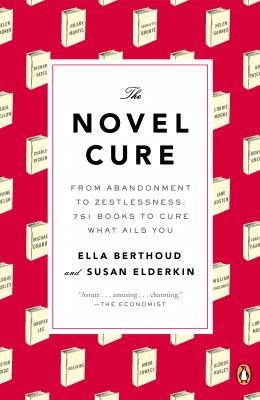I’ve become intrigued with the field of bibliotherapy, having been the recipient of a few recent articles forwarded from Facebook friends who have told me that I should consider becoming a bibliotherapist when I grow up.*
If you’re unfamiliar with bibliotherapy, it involves much more than suggesting a good book to someone going through a difficult time. Our colleagues at the American Library Association (ALA) offer the following description and background:
”The use of books selected on the basis of content in a planned reading program designed to facilitate the recovery of patients suffering from mental illness or emotional disturbance. Ideally, the process occurs in three phases: personal identification of the reader with a particular character in the recommended work, resulting in psychological catharsis, which leads to rational insight concerning the relevance of the solution suggested in the text to the reader’s own experience. Assistance of a trained psychotherapist is advised.’ —bibliotherapy in ODLIS, Online Dictionary for Library and Information Science.
“In 1966, the Association of Hospital and Institution Libraries, then a division of the American Library Association, issued a statement on nomenclature accepting the following definition:
“‘Bibliotherapy: The use of selected reading materials as therapeutic adjuvants in medicine and psychiatry; also guidance in the solution of personal problems through directed reading.’ (AHIL Quarterly, Summer 1966, p. 18.)”
For as long as I can remember, books have always been a source of comfort for me during times of personal struggle. Like many teenage girls who grew up in the ’80s, my formative years were spent with Judy Blume. Margaret and Deenie made me feel less alone and Davey (Tiger Eyes) showed me that life can go on after the death of one’s father. Other books were transformative during our infertility journey, parenting a child with autism and many other life challenges.
I’m a believer in literary kismet, the happenstance of discovering the right book at precisely the right time. And nothing makes me happier than matching a reader with a book that gives them new knowledge or insight — or simply some comfort or respite from the problems and worries at hand.
Bibliotherapy is more than this, of course. It involves specialized training and knowledge. Still, it’s a concept that I find fascinating and interesting to ponder.
In the meantime, while my job here at CLP isn’t one of a librarian, I love that I’m able to participate in opportunities to share my favorite books. Those of you who have visited one of our neighborhood locations may have noticed that some books (and DVDs and CDs, too!) have slips of paper tucked inside as bookmarks, indicating that it’s a “Staff Pick.” Displays in the libraries often highlight books that staff have selected as especially noteworthy. (My personal staff picks will be on display at the Main Library in Oakland next week. If you have a chance to visit, I’d love to know what you think!)
Who knows? Someday when I grow up, I might explore the possibility of pursuing bibliotherapy more seriously. (* Note to my bosses: I’m perfectly happy in my current job, thank you.)
And if I do, then I know I’m in the right place.
Bibliotherapy
Click here for more on bibliotherapy.What are some of the books that helped you through a difficult or challenging time in your life?
-Melissa F.
Melissa F. loves short stories (especially ones that are interconnected), literary fiction, memoirs, poetry and creative nonfiction. A native of Philadelphia, Melissa loves everything about Pittsburgh, especially working for the Library as Manager of Grants and Research.

